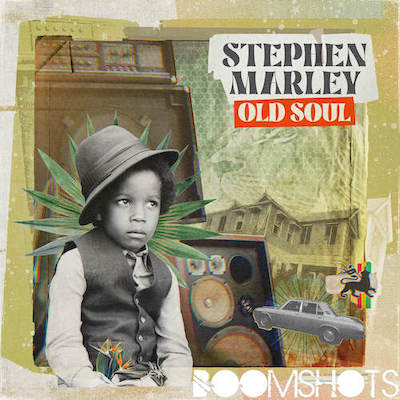
“Inside Me A Legacy Lives On,” Sings Ragga
“Anything that sounds good is good,” says Stephen Marley, paraphrasing Duke Ellington. Don’t be surprised to hear the King of Reggae’s son referencing Harlem’s master of the jazz orchestra. Never one to limit his musical horizons, Stephen has always listened without prejudice, letting his inspiration set him free as a singer, songwriter, musician, and producer—whether collaborating with his illustrious musical family, or with Lauryn Hill, Nas, or Erykah Badu. Beginning his lifelong musical journey at the age of six, Stephen shared historic stages with his legendary father and toured the world with his brother Ziggy and sisters Cedella and Sharon, The Melody Makers. The Tuff Gong instilled in all of his children a strict work ethic and an awareness that “music is way more than just music.” Review Continues After The Jump…
Over the past 45 years, Stephen has won no fewer than eight Grammy Awards—three with The Melody Makers, twice as a producer of his younger brother Damian Marley, and three times as a solo artist. Every one of his solo projects to date has topped the Billboard Reggae charts. Stephen Marley’s place in music history is already secure. He does not really need to push the envelope, to defy expectations, to let the whole world into his world. And yet that is just what he’s decided to do.
Stephen Marley’s highly anticipated fifth solo album Old Soul—his first full-length project since 2016—comes as a complete revelation. Despite his well-earned reputation as a studio perfectionist, “Ragga” as he’s known to friends and family, happens to be a consummate live performer with a knack for spontaneity. Old Soul leans into those strengths, opening the artist up as never before with songs that range from fun and whimsical to deeply personal.
“April 1972, my mom and poppa brought me through,” Stephen sings on the album’s moving title track. “Back then I was the favorite, so they say.” Reflecting on his life journey, Stephen marks his 51st year on earth by sharing glimpses of his past. “I’m an old soul, living in the body of a 9-year-old. Guess I’ve been here before.” While the Marley family is generally very private about their personal lives, Stephen opens up on “Old Soul” like never before.
The song was co-written with Jamaican pop star Omi, whose manager brought it to Stephen saying it fit him. “Me did haffi change up the years and kinda place my life in it,” Stephen says, “but really Omi give me the first inspiration.”
Before the pandemic, Ragga and his band toured incessantly, sharpening their live show night after night. During the COVID lockdown, he set up a new studio on a remote family farm in the Florida countryside, holding nightly jam sessions in a converted garage studio. With a stripped-down ensemble of binghi drums, bass, acoustic guitar, and flute, he played whatever he felt like—original compositions, reggae rarities with deep personal meaning, classics by Ray Charles, Frank Sinatra, and The Beatles. “Irie vibration,” Stephen says of the sounds they made together on the farm. The lion’s share of Old Soul was recorded during these unplugged jam sessions.
Exploring a wide-ranging musical palette that spans a variety of cultures and genres, Old Soul has the capacity to surprise and delight. Stephen and his big brother Ziggy collaborate on “There’s A Reward,” a heartfelt tribute to Joe Higgs, the man who mentored The Wailers when they were aspiring singers in Trenchtown. Eric Clapton plays guitar on a powerful acoustic version of Bob Marley’s “I Shot The Sherriff.” Bob Weir and Jack Johnson join Ragga on “Winding Roads,” the only song on the album recorded with a full band. Old Soul’s distinguished roster of guest appearances also include the likes of Damian Marley, Buju Banton, and Slightly Stoopid,
Ragga’s old friend Buju Banton appears on “Thanks We Get”
“When me tell him weh me ah do an’ ting,” Stephen recalls, “and send him the ting, you know Buju, twenty minutes later… him send it back!” Ragga laughs at the memory. “Yeah, man. True me know say ah fe him style dat: What a thanks we get!”
“We definitely did want some different sounds,” says Stephen. “We never wan’ come with the same ray ray ray. We try to make some of them ting you can’t really identify. Ah just music.” Among the more unexpected selections are a disarmingly sweet cover of Frank Sinatra’s “These Foolish Things (Remind Me of You)” as well as The Beatles’ “Don’t Let Me Down.” Stephen enlists his old friend Buju Banton on the ska-flavored “Thanks We Get,” a Scratch Perry composition made famous by Junior Byles that explores the idea that no good deed goes unpunished. Damian “Jr Gong” Marley joins his brother for a thought-provoking rendition of Stephen’s original composition “Who’ll Cast The First Stone?”
Stephen Marley is no stranger to acoustic recordings, which reveal the raw power of great songwriting and musicianship without the benefit of studio wizardry. Just a year after Stephen Marley released his 2008 solo debut Mind Control, he returned with an acoustic version of the same album, stripping each song down to its essence. Five years ago, Ragga embarked upon an acoustic tour of the U.S., then closed 2018 with the release of One Take Acoustic Jams, an EP recorded in the living room of his home studio the Lion’s Den—a precursor to the jam sessions at the farm that form the core of Old Soul.
The only track that wasn’t recorded on the farm is “Winding Roads,” a song that dates back to Stephen’s debut album, Mind Control. “It never make the album,” he explains. “It wasn’t the time.” Since then the song has had a rather winding road on its way to being released 15 years later. “Bob Weir heard the song and he liked it,” Stephen says. “So me go check Bob Weir.” Driving cross country for a session with the co-founder of the Grateful Dead, Stephen stepped into the studio with Weir’s band Wolf Bros., featuring Don Was on standup bass. “Bob Weir is a great man,” says Stephen. “We love how them have music so important that it no take effort. If you wanna play music, no talk. Just go play.” After that session was complete, Jack Johnson heard the song and wanted to get involved. “Nice vibes,” says Stephen, pleased with their final recording of a song that finally found its perfect expression.
The artistic evolution and free-wheeling song selection on Old Soul demonstrates Ragga’s courage to defy expectations. “You haffi be true to yourself,” he says. “I refuse to be put into any category. I am inspired by everything. So if me feel like me wan’ play some jazz music, me ah go play some jazz music. Who dig it, dig it.”
Even as the album showcases Ragga’s versatility, the message within his music remains consistent. “We come to free the people’s minds,” says the multi-Grammy winning singer, songwriter, and producer Stephen Marley. “Only way you can free your soul is to free your mind. My father say ‘No chains on my feet but I’m not free’ and then he come say, ‘Emancipate yourselves from mental slavery.’ Anywhere the music calls us, we are going to be there to spread the message of love and unity.”
Stream Stephen Marley’s New Album Old Soul
Subscribe to Boomshots TV
Follow Boomshots on Twitter
Follow Boomshots on Tumblr


